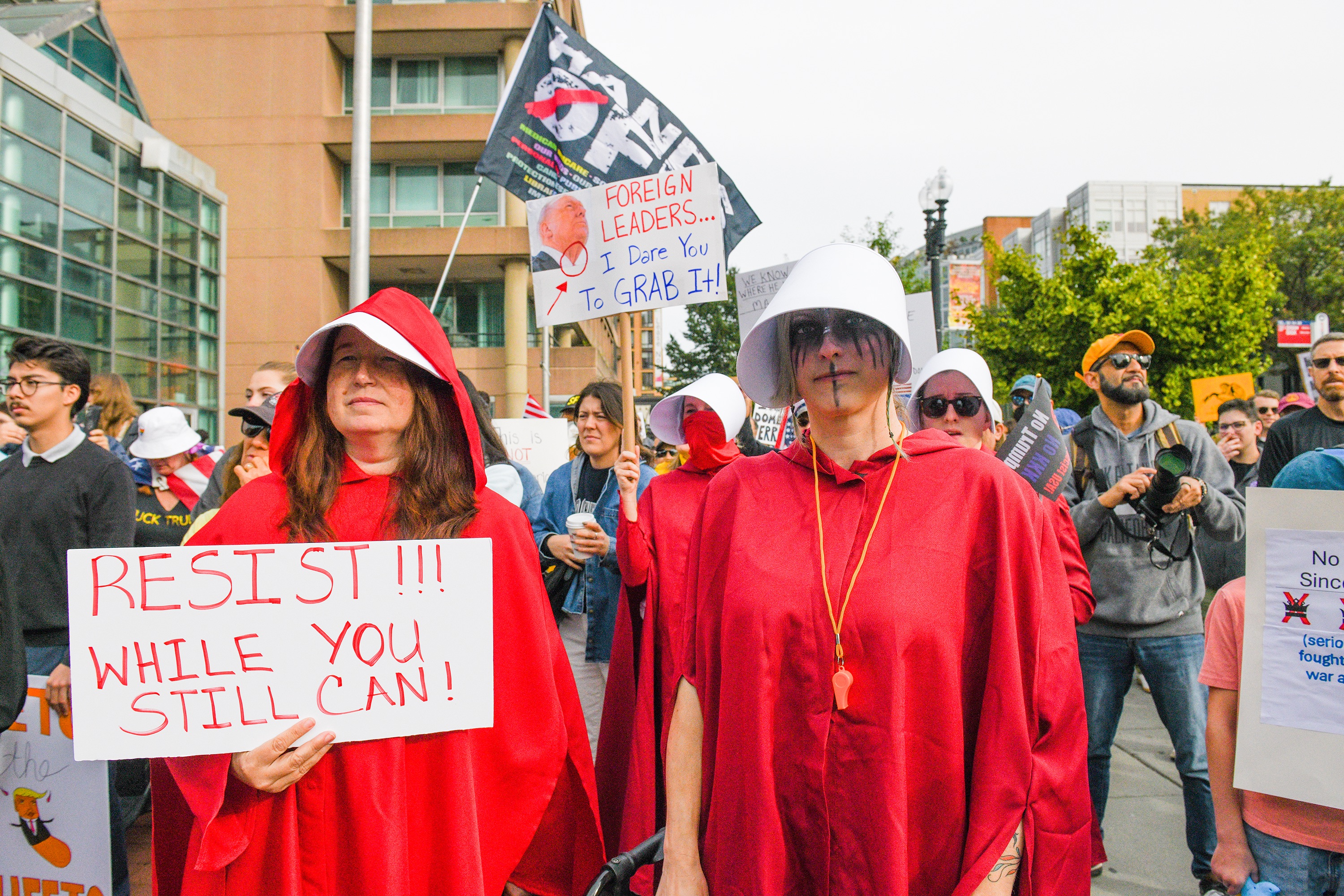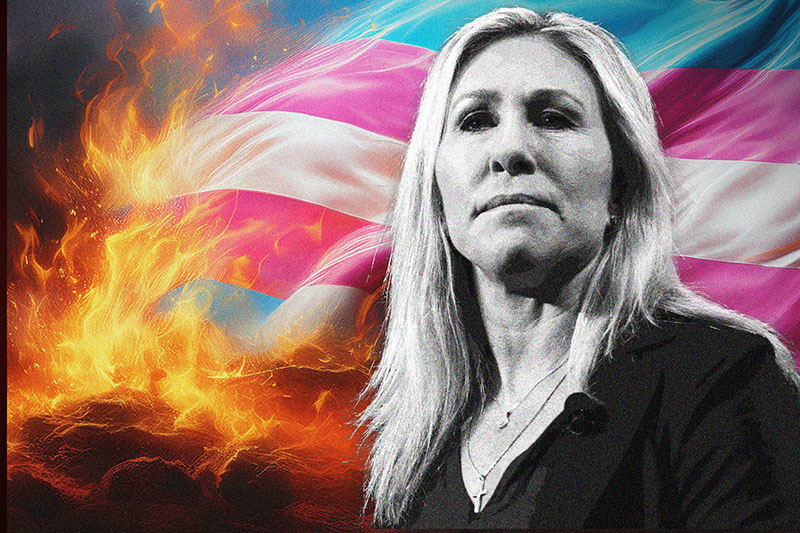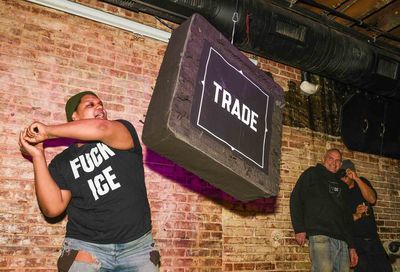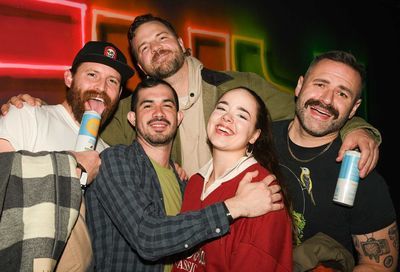Family Affair
Chrissy Gephardt speaks out about growing up, coming out and her father's presidential campaign
Photography by Todd Franson
Like so many parents confronted with a child coming out of the closet, Dick Gephardt’s first thoughts at his daughter Chrissy’s announcement were tinged with worry.
“You’re worried about your children always,” says the long-time Democratic congressman from Missouri. “And then you worry about your child being subject to discrimination and intolerance and all the things that happen.”
Although it was impossible not to worry about the challenges his daughter might face, he wanted to reassure her.
“You also love your children and you want them to do what they think is the right thing to do,” he says. “And so I told her ‘We love you unconditionally, we always have, always will, and we’re going to be there with you.'”
Since that coming out over two years ago, Chrissy Gephardt, 30, has entered the public eye as a very out and very active lesbian daughter of one of Washington’s most prominent members of Congress. She moved to D.C. with her partner, Amy, where both pursued careers in social work.
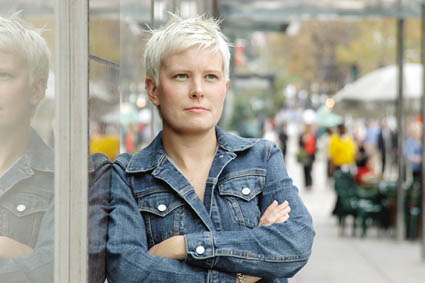 |
But Chrissy has taken a path to an even greater public presence, resigning from her job to work full-time on her father’s campaign for the Democratic presidential nomination. It’s a change that may seem surprising for someone who as a teenager tried to stay as far away from her father’s career as possible.
“This is where it’s all happening, and you really feel the energy,” she says. “Sometimes it’s hard to get that when you’re here in Washington. I love going to Iowa, I love going to New Hampshire. It’s exciting, it’s like, wow, we’re going to do this.”
Rep. Gephardt says he’s not worried whether his daughter’s presence in the campaign or in the spotlight will hurt his campaign in some of the Midwestern swing states where his campaign is promoting him as the most viable challenger to President George Bush.
“I don’t know whether it will [hurt me] or not,” he says. “I frankly don’t care. You’ve got to be honest with people about who you are and what your family is. And if they don’t like it there’s nothing I can do about it.”
Both father and daughter talk about his support of issues important to gays and lesbians, although there is some disagreement between the two on issues such as recognizing gay marriage. “I’m not in favor of gay marriage,” he says, adding that he would work “to adjust federal laws for civil union laws that are passed in states. I think that’s something that can be accomplished and should be accomplished.”
He points to his continued support for the Employment Non-Discrimination Act (ENDA) and hate crimes legislation. On the “Don’t Ask, Don’t Tell” military policy, he says he would have preferred a different alternative than what passed Congress, but calls the current situation “a failed policy.”
“I think we’ve got to go back and try to fix it,” he says. “In some ways what we’re doing now is probably worse than what we had before.”
“I probably am more liberal than he is in some ways,” Chrissy says. “I may not agree with him on every single issue, but I know that his heart’s in the right place, I know that he wants to turn this country in the right direction.”
Just named to Out magazine’s “Out 100” list of GLBT movers and shakers, Chrissy Gephardt seems poised to take a large and long-term role in the community. And hearing her talk, she seems ready to take on the challenge.
As a father, Dick Gephardt still worries about his youngest daughter, but thinks she’ll be just fine.
“You never want your child to be mistreated or hated or despised by anybody for any reason,” he says. “But she’s strong, she’s courageous, she’s a smart young woman. She tries to practice the Golden Rule, treating other people the way she’d like to be treated. I think if we [all] do that we can make progress.”
METRO WEEKLY: What’s your role in your father’s campaign?
CHRISSY GEPHARDT: Basically, it’s split between two things. There’s political work, like campaign trips to the primary states, whether it be Iowa or New Hampshire. And then there’s some fundraising, doing events around trying to raise money. But [my role] is primarily political: political organizing, retail politics, reaching out to voters, things like that.
MW: Define “retail politics.”
GEPHARDT: [Laughs] Literally, it’s going to a fair or a festival and walking up to people and saying, “Hi, I’m Chrissy Gephardt, my dad’s running for president. Would you like some more information on him?” You go to soccer games, Halloween parties, anywhere you can find voters.
MW: Is it hard introducing yourself to strangers and asking them to vote for your father?
GEPHARDT: I’m so used to it because I’ve been doing it my whole life. I’ve been campaigning for my dad ever since I can remember. He’s been in Congress for twenty-seven years, and every other summer we would go to St. Louis and campaign door to door, and I would say, “Vote for my dad.” So it’s sort of second nature.
MW: What’s the first campaign experience you remember as a kid?
GEPHARDT: I don’t really remember what year it was — I just remember getting in the car, having a huge stack of brochures, and I’ll never forget it was so hot. St. Louis summers are famous for being humid and oppressive. It was so hot, we’d sweat, and my brother and sister and I would complain all the time. We’d cry. You know, those are the things that we don’t usually tell people. [Laughs] We were kids. We didn’t want to go knock on people’s doors. We wanted to be home watching TV in the air conditioning, eating mac and cheese.
MW: Were there parts of it that were fun for you?
GEPHARDT: I think the fun parts were going to the picnics and eating the food. To be totally honest with you, I was not really into politics when I was younger. I did it for my dad, because I thought he was a good person. He’s my father. That’s the reason I did it. It wasn’t because I loved politics.
MW: Generally, when kids work for their parents there comes time when they no longer have to work for their parents. Did you reach a point where you were like, “That’s it, I’m done?”
GEPHARDT: Once I got into high school and college, I completely removed myself from it. I went through that phase where I pushed it away completely, because I was almost embarrassed about being the child of a political figure. It was sort of like, “Oh, your dad’s a politician, he must be a crook.” So I wanted to stay as far away from it as I could. Now I have a new appreciation for the political process, and a new appreciation for all the work that my dad has done for all of his years in Congress — that he really does want to change this country, and that politics really is an honorable profession.
MW: Did your political views during college become different than your parents’ views?
GEPHARDT: Yeah. I went through the ultra-liberal phase where anything would have flown and my dad was too conservative. But I sort of came around and became more of a realist the older I’ve gotten.
MW: How old were you during your father’s first presidential campaign in 1987?
GEPHARDT: I was fourteen and in the eighth grade. That was part of my whole identity crisis thing, with not wanting to identify with politics. I wanted people to like me, to accept me, and I thought having a dad who was running for president was a liability.
MW: In retrospect was it?
GEPHARDT: It kind of was. People used to always come up to me in the cafeteria and say things like, “We’re going to come to the White House and watch movies.” And I was like, get away, get out of my face. I wanted them to talk about normal things, like, we’re going to go cruise the mall tonight and look for guys. I didn’t want to talk about my dad running for president. I felt like it made me different, and all you want to do when you’re an adolescent is be just like everyone else.
MW: What was the thing that made you want to be involved again?
GEPHARDT: Seeing how much what happens in government really affects things at the micro level. Even before I became a social worker, just being a person who was paying taxes and buying my own house and living like a real adult, you see just how all these things really do affect you. [For example,] healthcare — my first job out of college I didn’t have health insurance. And in my job as a social worker, I started to see how government programs affected my clients, whether it be Medicaid, Medicare or Social Security Disability, prescription drug programs, all the types of things that are determined by your president. I was working in the profession with George Bush in office, and it’s been awful. Our programs have been cut, the agency I was working for had to lay people off. It’s just not good.
MW: What type of social work do you do?
GEPHARDT: I was working in a mental health agency in D.C., primarily with women with mental illness who also had substance abuse disorder and a history of trauma in their lives, whether that be childhood abuse or some sort of adult abuse like domestic violence or sexual assault. I studied mental health and substance abuse in my master’s program. I’ve worked in a detox center in a hospital, I’ve worked in an outpatient substance abuse treatment facility. I’ve worked in an employee assistance program.
MW: Have you ever worked on issues of addictions in the lesbian and gay community?
GEPHARDT: I haven’t worked in that area, but I did some papers on it in my master’s program, on the high rate of addiction in the gay and lesbian community and that it’s more prevalent because of mental health issues — using alcohol and other drugs as a self-medicator because of the fear of coming out and all that stuff. [Also,] studies have shown that gay and lesbian people tend to access health care less frequently because of the stigma and fear of coming out to their doctor for what that might mean for their health care.
MW: The papers you did on those issues, was that before you came out?
GEPHARDT: Yeah. That was part of my coming out. I took a bunch of courses in family therapy, and I had to do a big project at the end. I studied the dynamics of gay and lesbian families and adoption. I wasn’t out at the time. The thing that’s great about social work school is that everyone’s very liberal — if you did a project on HIV and AIDS, no one thinks you’re doing it because you have HIV. You’re there to serve a diverse population in your community — our professors always challenged us to pick a topic that doesn’t pertain to our lives, because that’s how you learn. So I studied foster children and I studied childhood abuse because I was trying to broaden my horizons. But I had a special interest in [the gay and lesbian] one.
MW: Would you describe your political beliefs as pretty consistent with your father’s?
GEPHARDT: I probably am more liberal than he is in some ways, but for the most part he’s solid on many of the issues that I believe in. A lot of times people will ask me, “How do I choose a candidate?” I say choose a candidate who for the most part lines up with what you believe in. You’re never going to find a candidate who is one hundred percent [for] everything that you believe in. But find somebody who has the right values, the right beliefs, who you think is going to be the strongest leader. And I think that’s my dad. I may not agree with him on every single issue, but I know that his heart’s in the right place, I know that he wants to turn this country in the right direction, and he’s going to be able to do that.
 |
MW: The Democratic presidential candidates seem to be pretty gay positive across the board. Why should gays and lesbians vote for Gephardt, based on gay issues?
GEPHARDT: First of all, my father has had a great record in terms of GLBT issues. He’s led the fight in Congress for hate crimes legislation, he’s fought for the Employment Non-Discrimination Act, he’s got a long history with the community and a great record. He’s had a one hundred percent rating with the Human Rights Campaign, and he’s been a huge supporter of funding for HIV and AIDS. He’s been a friend of the community for a long time. My dad didn’t do civil unions in a state, but he’s been a federal level legislator for twenty-seven years. He’s been leading that fight and he’s been bringing those issues up in Congress for a long, long time. He’s great on those issues, and he’ll continue to be.
The other thing is that my dad can win. He can beat George Bush in the general election. It’s one thing to put in a candidate who’s good on these issues, but it’s another thing to put somebody in that can actually beat George Bush. My dad’s that person. The fact that he’s from the middle of the country [means] he’s going to be able to sway a lot of voters who are seemingly more moderate, more conservative, in the middle of the country, in states like Ohio, Indiana, Pennsylvania, Tennessee. Those are key states. Those are the swing states that if we’re going to win this election as Democrats, we’ve got to put in a candidate who can win those states. That’s my dad. My dad is the only top-tier candidate from the middle of the country.
MW: Some would say that one of the reasons that Democrats don’t do well in the middle of the country is because of gay and lesbian issues. Will his positions on gay issues cut against the argument that he’s the strongest candidate for the middle states?
GEPHARDT: I’m sure that it will have an effect. My dad says, “If this issue hurts me, so it hurts me, but I’m not going to run from it. I’m going to be honest about my family. My family comes first.” But that’s the great thing about my dad — he’s a Democrat in every sense of the word. He’s got a broad appeal. It’s not like he’s out there talking about gay and lesbian issues all the time — he’s focusing on the key issues of this campaign, which are healthcare, the economy and jobs. These are the things where it doesn’t matter what kind of a voter you are, whether you’re gay and lesbian, whether you’re straight, whether you’re a minority — they’re important to everybody. That’s what he’s focusing on, that’s his main message. And that’s what I think people are hearing.
MW: There are actually two of your father’s votes I want to ask about: his vote for the Defense of Marriage Act and for Don’t Ask, Don’t Tell. Those were two big losses for the gay community, particularly Don’t Ask, Don’t Tell. How do you feel about those two votes?
GEPHARDT: I’ve talked to my dad about DOMA, and he knows that I think that it was a bad vote. Essentially, my dad has always been good on these issues, [but] it wasn’t a good vote. I’m sure there were other reasons why he did it. My dad has evolved over the years — he’s studied, thought hard about his decisions in terms of how he’s voted, and he’s learned from what he’s done. I know that today he would not be voting for something like DOMA. He’s learned from Don’t Ask Don’t Tell — he’s realized that it’s been harmful, it’s been damaging psychologically to our armed services and the men and women who are serving. We’ve got to do something about it, we’ve got to change, and he’s committed to doing that. He’ll do that when he’s president.
MW: What part of your father’s record are you the most proud of?
GEPHARDT: I would have to say all of the work that he’s done for working people. I’m proud of what he’s done in sticking up for the rights of workers and protecting the environment. For example, he stood up to President Clinton on NAFTA — I’m proud of the fact that he stood up against even his own president because he believed that we should not be exploiting our workers, compromising their safety, compromising their rights. I see it as very much an alignment with what I believe in. It’s that spirit of fighting for working people, fighting for the underdog, fighting for people who don’t have a voice.
MW: On the opposite side, what’s the part of his record that you dislike the most?
GEPHARDT: The DOMA vote. [Also,] I would have to say that I think he should be totally pro-choice, across the whole board. He supports a ban on late-term abortions. I think if you’re going to be for a woman’s choice, you need to be for it across the board. You should leave that up to a woman and her doctor to decide. The only thing that does make me feel somewhat better is that he is for [an exception] clause for the health and the life of the mother, which kind of leaves the window pretty wide open for doctors and mothers to decide if it’s really in their best interests to abort the child or to keep it. So in that respect I can justify it a little bit better, but I still think that if it were up to me that it needs to be consistent, that you need to be for choice across the board.
MW: Some people on both the left and right are sort of selling Gephardt as a conservative Democrat, at least around national security issues.
GEPHARDT: I don’t know that I would use the word conservative Democrat. I would have to say he’s a practical Democrat. I think that he has taken a very practical standpoint on the war in Iraq, and how we’re handling the situation. He supported spending the $87 billion over there. He said, we got ourselves into this situation, and now we have to be responsible, we have to support our troops. What kind of a message does it send — not only to our troops but to the world — if we’re not willing to spend the money over there? How can we say to other countries we need your help, but we’re not even willing to put our money forth? We got into this, we need to help start the rebuilding process. Also, our troops are probably demoralized over there. To then get the message from the United States that we’re not going to support them with the $87 billion, that would demoralize them even further. He believes that we need to send a strong message, not only to the troops but to the rest of the world, that we’re going to be there for them. That’s a very practical, reasonable thing.
It’s not that he’s agreeing with George Bush and his misguided policies, because God knows he calls them a miserable failure at any chance he can get. He’s very critical of the way George Bush has handled it, the fact that he hasn’t brought in the United Nations and other countries. I’m proud of the stance he’s taken. I think all the other candidates should step up to the plate and do the same thing.
MW: What was your first conversation with your parents about your being lesbian?
GEPHARDT: I told them over dinner in St. Louis. They asked practical questions like, “What do you want to do, what does this mean in terms of your future, are you telling us that you want to get divorced?” It was them trying to figure it out. My dad wanted to know how I identified — am I a lesbian, am I bisexual? I was like, I don’t know. Right now I know that I’m in love with Amy. It’s definitely something that I’ve thought long and hard about, and I definitely want to leave my marriage. And my parents said, “We’ll be there for you, we’re not going to leave your side.”
MW: When did you get married?
GEPHARDT: I got married in 1997 — I was twenty-four. That was the problem right there. [Laughs] I met my husband in undergrad, and we dated from sophomore year on. He graduated a year ahead of me and went to medical school at Washington University in St. Louis. So I moved there to be with him. We dated for another couple of years and then we got married.
MW: The two of you are still friends, right?
GEPHARDT: We occasionally exchange e-mails — it’s not like we talk all the time, but he’s doing well. He’s moved and he’s out dating again. I’m happy that he was able to move on and that he’s happy. For a long time I felt really guilty. I didn’t want to hurt him, because he’s a good person. It wasn’t like I wanted to divorce him because I hated him, that wasn’t it at all. I was having my own personal life crisis. It was a very heart-wrenching moment when I told him. He asked if I would be willing to consider staying married. We went to counseling once, and it was hard. I felt like I was breaking his heart. But it wasn’t messy at all. We split everything up very civilly. We didn’t even have a lawyer.
MW: How did you meet Amy?
GEPHARDT: In graduate school. We became friends, and then started to fall in love with her, and the rest is history.
MW: You were talking earlier about how when you were a kid you wanted to be called “Chrissy” so everyone would know you were a girl. Were there times during your childhood or adolescence that you suspected or knew in some way about yourself?
GEPHARDT: Yeah, I did. I always had friends when I was younger that I thought were really cool — they were like really cool. I had crushes on them was what was going on, but I just thought they were cool. But there were other things that sort of tipped me off, like Playboy and stuff — I was like, yeah, that’s cool. And I [told myself], I’m just curious. It’s amazing how your mind can just write it off as curiosity.
MW: Even if you had had some inklings, you did fall in love with a man and get married. What do you think kept you from coming out earlier, before you even got into that sort of a situation?
GEPHARDT: I think it just shows the societal pressure to follow the right path, whether it be the negative comments I would hear, at school or among my friends — you know, “that faggot,” or “that dyke.” Plus, I got so many messages from so many people that when you grow up you should fall in love, marry a man, and have grandchildren. It was scary to stray from that. And so I followed that path because I wanted to make my parents proud of me. I didn’t want to disappoint them.
MW: Did you feel pressure to be a certain way because of your dad’s career?
GEPHARDT: Totally. I probably felt more pressure to do the right thing because of who he was and I didn’t want to mess things up for him and ruin his career. I probably put myself on a lower priority on the scale because I thought everything I do has to be for my father, you know, so that I don’t ruin his elections or turn voters turn against him. There was a lot riding on my shoulders. It might have been more me than other people, but I was really concerned about making my parents proud and doing the right thing. Growing up everyone used to always say, “The Gephardts have such a nice family.” So for me to come out, I felt like it was a big deal because I felt like I was shattering that image of the Gephardt family and what we represented.
MW: How has your relationship with your parents changed since you came out?
GEPHARDT: It’s actually better than it’s ever been. It’s more honest, it’s more open. I share my feelings with them about anything, because I’m not hiding this big secret anymore. It’s great. Before I was very tight-lipped about everything. I didn’t tell them a lot about my marriage, because there were problems and I didn’t want them to know. My parents really didn’t know much about my relationship with my husband, but with Amy [they do]. Part of it is because we live in the same city, so they see her a lot more often than they saw my husband. But I’ve learned to be up front and honest with my parents, it makes all the difference. I feel better, they feel better, and there’s nothing to hide anymore.
MW: However the election comes out, when it’s over are you going to go back to what you were doing before, or are you going to stay in politics?
GEPHARDT: I haven’t decided that yet. In a very strange way the work that I’ve done in social services corresponds with what I’m doing now because the overarching central theme to social work is social justice. It’s about empowering people, empowering communities — that’s really what it’s about. Even if I’m working on a macro level advocating for gay and lesbian rights, I’m still being true to what I believe in. I don’t know exactly how it’s going to manifest itself, but I’ll definitely be advocating and communicating my social justice message wherever I go.
MW: Would you ever run for an office yourself?
GEPHARDT: I’m not totally sure about that. I’ve thought about it, but we’ll have to see.
MW: How do you feel about the media’s coverage of you so far? Do you feel you’ve been treated fairly or unfairly, or in surprising ways?
GEPHARDT: I think it’s been positive. Sometimes I’m surprised that there’s such an emphasis on it. I mean, I’m just working to help elect my father. Even if I wasn’t out or even if I was straight and married, I would still be totally committed to his campaign. It’s kind of funny sometimes — I get a chuckle out of people wanting to interview me, because I’m just Chrissy Gephardt. I’m doing this work for my dad.
Support Metro Weekly’s Journalism
These are challenging times for news organizations. And yet it’s crucial we stay active and provide vital resources and information to both our local readers and the world. So won’t you please take a moment and consider supporting Metro Weekly with a membership? For as little as $5 a month, you can help ensure Metro Weekly magazine and MetroWeekly.com remain free, viable resources as we provide the best, most diverse, culturally-resonant LGBTQ coverage in both the D.C. region and around the world. Memberships come with exclusive perks and discounts, your own personal digital delivery of each week’s magazine (and an archive), access to our Member's Lounge when it launches this fall, and exclusive members-only items like Metro Weekly Membership Mugs and Tote Bags! Check out all our membership levels here and please join us today!








